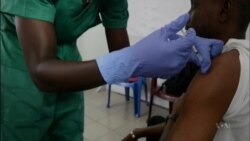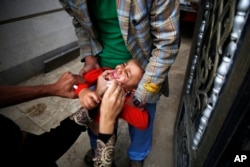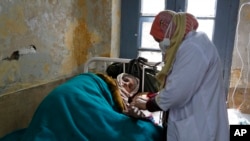2015 was a remarkable year in medicine: A vaccine against Ebola proved amazingly successful, the number of deaths and new infections from HIV dropped drastically, and an eradication campaign against polio could mean no child in Africa will ever get the disease again.
Experts initially thought the Ebola outbreak would end well before 2015. Instead, it claimed 3,000 lives before it began to wane. Potential vaccines were fast-tracked and clinical trials began in West Africa early in the year. Then in July, good news came about a vaccine trial in Guinea.
"Based on the number of individuals and the number of cases that we have seen, there is 100 percent protection in those vaccinated," Dr. John-Arne Røttingen told VOA. Røttingen directs the division of infectious diseases at the Norwegian Institute of Public Health and headed the study steering group.
It was truly an international effort — a collaboration between the government of Guinea, the World Health Organization, Doctors Without Borders and the Norwegian Institute of Public Health. The vaccine was developed by the Public Health Agency of Canada and licensed to U.S. pharmaceutical company Merck, which made the investigational vaccine. The U.S. and Canada, among others, provided the funding.
The vaccine combined a protein of the strain of Ebola that ravaged West Africa and another, unrelated virus. The randomized trial was so successful, it was stopped in late July so everyone who was at risk could be vaccinated.
HIV infections, deaths fall
In 2015, the world made progress in the fight against another lethal virus, HIV, which causes AIDS. Just before World AIDS Day on December 1, the United Nations released data showing that nearly 16 million people are now on HIV treatment and that new infections have fallen by 35 percent since 2000. Also, AIDS-related deaths have fallen by 42 percent since the peak in 2004.
Dr. Anthony Fauci, at the National Institutes of Health, has spent much of his life working to end the AIDS pandemic. He told VOA, "If you look at the trajectory of the epidemic, we are on a course toward ending it in the sense of 'as we know it,' because we’ve always known it as going up. Now it’s flattening off, and now it’s going to start to go down. And we're starting to see that decline."
Researchers also discovered that if people at risk of getting HIV took one pill called Truvada every day, they could reduce the chance of getting the virus by more than 90 percent. The pill contains two medicines that are also used in combination with other medicines to treat HIV. The pill can can help stop the virus from establishing a permanent infection.
Major strides in polio
2015 also saw a huge advance in ridding the world of polio. At one time, the polio virus circulated in 125 countries. In September, the WHO removed Nigeria from the list of polio-endemic countries.
Getting all Nigerian children immunized was a huge challenge. It took the Nigerian government, thousands of volunteers and help from the WHO, UNICEF, the Bill and Melinda Gates Foundation, Rotary International and others to get it done.
They tracked nomadic tribes, immunized children in areas of conflict during lulls in fighting and worked with leaders who resisted immunization for political, religious or other reasons. If Nigeria stays polio-free until July 24, 2017, all of Africa will be polio-free. Only two nations remain — Afghanistan and Pakistan — where the virus circulates.
"If we could knock it out there, we’re finished with wild polio virus," said Dr. Jay Wenger of the Bill and Melinda Gates Foundation.
Despite the successes in 2015, there are concerns. The WHO warned about the path toward a post-antibiotics era, one where common infections will again kill. Antibiotics have been used for the last 70 years to treat people suffering from infectious diseases and to prevent infection from setting in after surgery. Now, many infectious diseases are becoming resistant to antibiotics, including HIV infection, staph infections, tuberculosis, influenza, gonorrhea and malaria.
The WHO has called for an intensified campaign in 2016 to end the global TB epidemic. It says tuberculosis is now the world's leading infectious killer, topping HIV/AIDS. Deaths from TB are down almost 4 percent since 2000, but there are still concerns.
"Multi-drug-resistant tuberculosis, MDR-TB, is like Ebola with wings. It has the same rates of transmission as Ebola but can be transmitted even by coughing in the air, in the train, in the church, in a bar, in a hospital. It’s a serious threat," Dr. Ariel Pablos-Mendes said at a program to announce the program to end TB.
Challenges also lie ahead in developing treatments and vaccines against newly emerging infectious diseases and in getting the polio vaccine to Afghan children in areas held by Islamic militants. The militants, including the Islamic State group, have been preventing vaccination campaigns in remote areas. The concern is not just for the children in remote villages where polio is spreading; there are fears the disease, which is transmitted through person-to-person contact, will spread and re-emerge in areas where it has been eradicated.
By year's end, the militants were not willing to accept any medication, according to reports VOA received from the provincial areas of Afghanistan.








